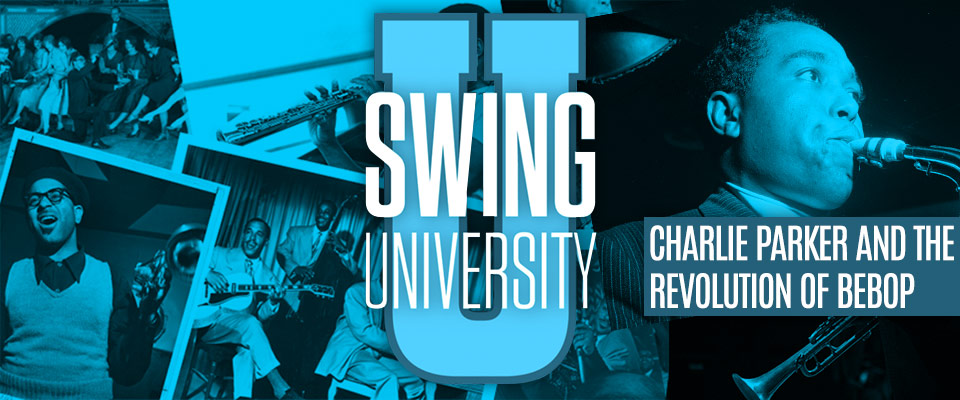
Charlie Parker and the Revolution of BeBop
Part of United We Swing: Jazz and American History
The revolution of bebop in the 1940s saw jazz get faster, more virtuosic, and more daring. And no one was more extraordinary than the alto saxophone master Charlie Parker.
Part of the United We Swing: Jazz and American History series presented by Jazz at Lincoln Center.
If you use Spotify, you can listen to a playlist of the music Seton featured in his discussion HERE.
You can also listen through the YouTube playlist on this page; simply click the play button on the video on this page. Or if you want to listen to an individual song, click on a title in Seton's notes below!
Sometimes the hype around an artist is overblown or overly effusive. And sometimes an artist genuinely enacts a musical revolution. Charlie Parker’s alto abilities, his invention and innovation of the BeBop style and language meant that in the 1940s, Jazz would fundamentally and permanently change. His genius as an alto saxophonist was and is so pronounced that almost no alto saxophonist exists today who is not heavily indebted to Parker’s playing style. Jazz itself, while rarely performing BeBop in its pure form today, works in the legacy of BeBop, with modern styles serving as direct descendants of this language.
- Hootie Blues – Jay McShann Orchestra
- Recorded April 30, 1941
- Why: Listen for a very young (20) Charlie Parker taking a solo. Bluesy and beautiful, it also has elements of his nascent BeBop style, with its more driving attack and rhythmic charge
- Groovin’ High – Dizzy Gillespie Sextet
- Recorded February 28, 1945
- Why: The pairing of Diz and Bird is truly the stuff of legend, and every recording they made together in 1945 is not only a classic, it is a defining moment in 20th century music!
- Hot House - Dizzy Gillespie And His All Star Quintet
- Recorded May 11, 1945
- Why: More genius writing and playing (by the way, this piece is called a “contrafact,” which means its form and chords are based off a different song. “Hot House” is a contrafact of “What Is This Thing Called Love”), and the increasing spread of the BeBop language to the other instruments means that a new ensemble style is rapidly building.
- Now’s the Time – Charlie Parker’s Reboppers
- Recorded November 26, 1945
- Why: Parker’s debut as a bandleader! “Now’s the Time” is an extraordinary blues, and Parker’s solo is one of the greatest of all time (you can also hear a very young Miles Davis take a solo here too)
- Koko - Charlie Parker’s Reboppers
- Recorded November 26, 1945
- Why: The virtuosity of Parker and Dizzy (to say nothing of Max Roach on drums) shows off the fire and genius in BeBop.
- Mango Mangue - Machito And His Afro Cuban Orchestra
- Recorded December 20, 1948
- Why: Music does not exist in isolated vacuums. The innovations in BeBop occurred at the same time as the innovations in what would ultimately be termed Latin Jazz. What’s more, the two styles informed one another’s developments, and shared artists across styles too! This pairing of Charlie Parker with Machito and his Afro Cubans is one of the most dazzling examples.
Individuals with disabilities are encouraged to attend all University of Iowa sponsored events. If you are a person with a disability who requires a reasonable accommodation in order to participate in this program, please contact Paris Young in advance at (319) 467-4849 or at paris-sissel@uiowa.edu.

